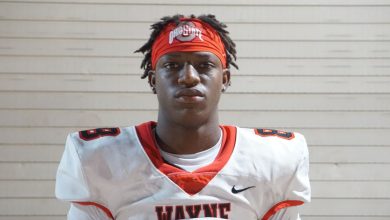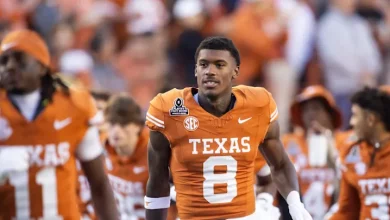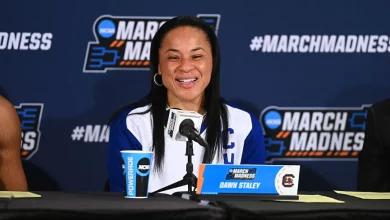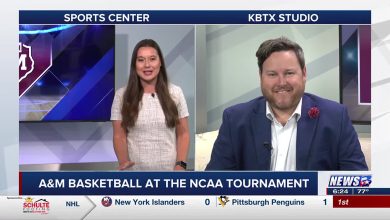Angeli was in a three-way battle to replace Riley Leonard as the starter, but but the competition may not have gone the way Angeli expected.
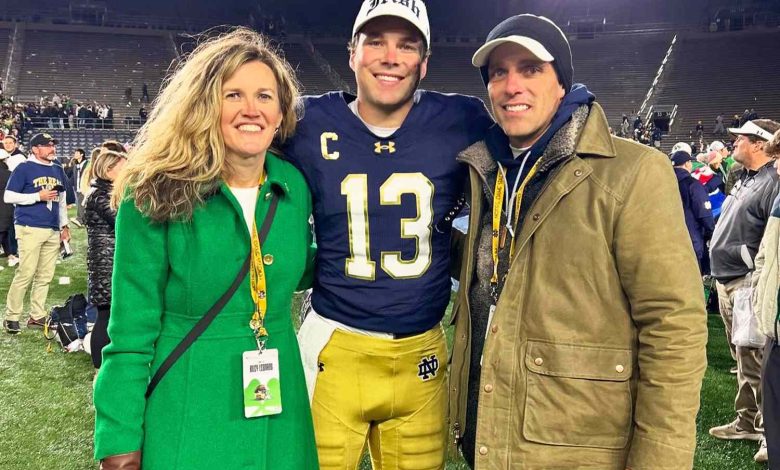
The nature of college football today means few positions are as fluid and fragile as quarterback. At Notre Dame, the position has seen a carousel of names in recent years—from Ian Book to Jack Coan to Sam Hartman and most recently Riley Leonard. The next in line? That question looked to be up for grabs this spring, with Steve Angeli vying in a three-man race to replace Leonard, but the battle may not have gone quite the way he envisioned.
Now, with the dust still settling from Notre Dame’s spring game, reports have emerged that Angeli plans to enter the transfer portal, opting to look elsewhere for his final season of eligibility. For a player who’s waited patiently in the wings and been a steady leader in the quarterback room, it’s a bittersweet departure—one rooted in competitive realities and personal ambition.
Angeli’s transfer marks a significant development in the Irish quarterback saga and signals the closing of one chapter while opening another, both for him and for the program.
The Setup: A Three-Way Quarterback Competition
Heading into the 2025 offseason, Notre Dame’s quarterback depth chart had three primary contenders for the starting job following the departure of Riley Leonard, who had transferred in from Duke for the 2024 season but was limited by injury and inconsistency.
The competition featured:
- Steve Angeli, a senior with four years in the program, respected by coaches and teammates, and coming off a solid showing in limited action.
- CJ Carr, the five-star sophomore and grandson of Michigan legend Lloyd Carr, who had shown flashes of brilliance in practices and carried immense expectations.
- Kenny Minchey, a redshirt freshman with a strong arm and raw talent, pushing for a bigger role after a year of development.
From the outset, it appeared the job was wide open. Head coach Marcus Freeman and offensive coordinator Mike Denbrock stressed that the quarterback battle would play out over the course of spring camp and that no decisions would be rushed. Angeli, with the most experience in the system, seemed to have an early edge based on familiarity and leadership.
But the narrative evolved quickly.
Why Angeli Believed This Was His Moment
For Angeli, this spring was supposed to be his time. After several years as a backup, he had paid his dues, learned the system, and shown composure in the limited snaps he received. Most notably, in last year’s Sun Bowl, Angeli started in place of the injured Leonard and performed admirably—throwing for over 200 yards, managing the game well, and even earning postgame praise for his leadership and poise.
In the lead-up to spring ball, Angeli approached his preparation with a starter’s mentality. He spent time mastering Denbrock’s offensive concepts, took on a vocal role in meetings, and was reportedly one of the most locked-in players during offseason workouts.
More than just being prepared, Angeli represented the kind of steady, mature leader that coaches often trust when faced with uncertainty. He may not have the flashiest tools, but he’s cerebral, decisive, and respected. All of that gave the impression that, finally, the stars were aligning for him.
The Shift: Carr Emerges as the Front-Runner
But as spring practice unfolded, the picture began to change. Reports out of camp began to describe CJ Carr as the quarterback making the biggest leap. His zip on the ball, feel for the game, and growing comfort in Denbrock’s offense impressed both coaches and teammates. While Carr still had things to learn, the upside was too difficult to ignore.
Carr had begun the spring as a theoretical option. By the time the spring game rolled around, he looked like the future.
Though Notre Dame didn’t name a definitive starter after the spring game, Freeman’s comments suggested Carr had pulled ahead: “CJ has grown tremendously this spring… He’s stepping into the role and earning the trust of everyone around him.”
Minchey, for his part, continued to develop but remained behind the top two on the depth chart.
The writing was on the wall for Angeli. Despite doing everything right—despite staying patient, working hard, and representing the program with class—his opportunity to lead Notre Dame’s offense in 2025 was slipping away.
Making the Call: Angeli’s Decision to Transfer
Angeli’s decision to enter the NCAA transfer portal is one born of both practicality and ambition. With only one year of eligibility remaining, he doesn’t have the luxury of waiting out another season on the bench. He wants—and deserves—the chance to start. And with the door effectively closing at Notre Dame, he’s taking control of his football future.
It’s not a decision made lightly. Angeli has been a program guy from day one. He’s mentored younger quarterbacks, kept his head down, and stayed ready. But even the most loyal players must eventually weigh loyalty against opportunity.
The timing—immediately following the spring game—suggests the decision was influenced by his performance and the staff’s internal evaluations. It also gives him ample time to find a new program ahead of summer workouts and preseason camp.
Where Could He Land?
There’s little doubt Angeli will draw interest in the portal. He brings a lot to the table:
- Experience in a high-level program
- Smart, efficient quarterbacking
- Strong character and leadership qualities
- Game-day readiness
Schools that may not have landed a transfer quarterback during the winter window—or those who have uncertain QB situations—could view Angeli as a steadying option.
Potential fits might include:
- Boston College: Rebuilding under a new regime with questions at quarterback.
- Pitt: Needs a veteran to compete immediately and could be a natural fit for a northeast guy like Angeli.
- Duke or Wake Forest: Systems that value quick decision-making and precision passing.
- Group of Five contenders: Places like SMU, Memphis, or Appalachian State could offer immediate opportunities and showcase him as a leader.
In the right system, Angeli has the tools to thrive. He’s not a dual-threat highlight machine, but he plays winning football—protecting the ball, making smart reads, and commanding the huddle.
What It Means for Notre Dame
Angeli’s exit simplifies the Irish depth chart but creates a gap in leadership. Notre Dame is now all-in on the youth movement—CJ Carr as the expected starter, backed by Minchey and true freshman Deuce Knight.
Carr may have the tools, but Angeli brought experience. Should Carr struggle early or suffer an injury, the Irish would have to rely on a less-seasoned option. That’s the tradeoff in the modern era: develop talent and risk inexperience, or keep veterans and risk losing future stars to the portal.
Still, this move seems to confirm Notre Dame’s long-term confidence in Carr. He is the centerpiece around which the Irish offense will be built. Denbrock’s scheme favors quick decision-making, vertical passing, and high-level anticipation—all areas Carr has flashed proficiency in.
But in losing Angeli, Notre Dame also loses one of its strongest locker room voices, a player who bridged coaching transitions and served as a culture-carrier behind the scenes.
Portal Era Takeaways: A Common but Difficult Story
Angeli’s story is becoming more and more common in the era of the transfer portal. Talented quarterbacks, buried behind higher-ceiling players or logjammed by timing, are choosing to bet on themselves elsewhere. For some, it leads to a resurgence; for others, it becomes a stepping stone toward coaching or other football opportunities.
It’s not a failure—it’s simply the new normal. For programs like Notre Dame, managing this reality is part of the job: building a pipeline while knowing that not every player will finish where they started.
Legacy in South Bend
Though he never got the chance to be the full-time starter, Angeli’s impact in South Bend can’t be measured in stats or wins. He was the definition of a team-first player—steady, smart, and supportive, even when it meant waiting behind others. He was a quiet cornerstone of the QB room during a period of change.
Whether or not he lights it up at his next stop, he leaves Notre Dame with a degree, the respect of his coaches and teammates, and the gratitude of fans who saw his commitment, even when it didn’t make the headlines.
And that’s what makes his story compelling—not the battle he didn’t win, but the way he fought it with class.



